GLEE GAMES Camp Seeks to Spark High School Girls' Interest in Electrical Engineering
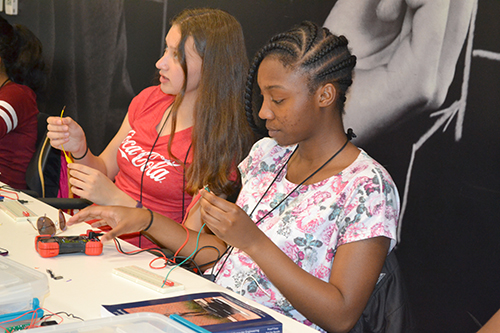
Two GLEE campers work on LED calculators during a GLEE GAMES camp hands-on activity.
June 28, 2018
Ever flip a switch and marvel at the magic of electricity accomplishing a task? During the week of June 17–23, the 17 high school girls who participated in GLEE (Girls Learning Electrical Engineering) G.A.M.E.S. (Girls’ Adventures in Mathematics, Engineering, and Science) camp not only learned about Electrical Engineering, but they did some engineering themselves. And helping lead the activities were several female ECE students—role models who demonstrated that girls can become electrical engineers.
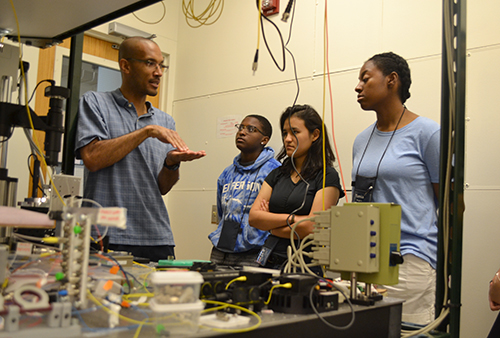
Lynford Goddard (left) explains to the campers how equipment in an MNTL lab works.
The camp activities involved a number of teaching sessions where the girls were indoctrinated into the mysteries of how circuits and electrical current work. These were followed by hands-on activities where they actually built what they had just learned about. So throughout the weeklong camp, the girls built a circuit, soldered a radio phone, and designed then built an LED calculator. Along with hands-on activities, the girls toured labs in several facilities, including Beckman and MNTL (the Micro Nanotechnology Lab).
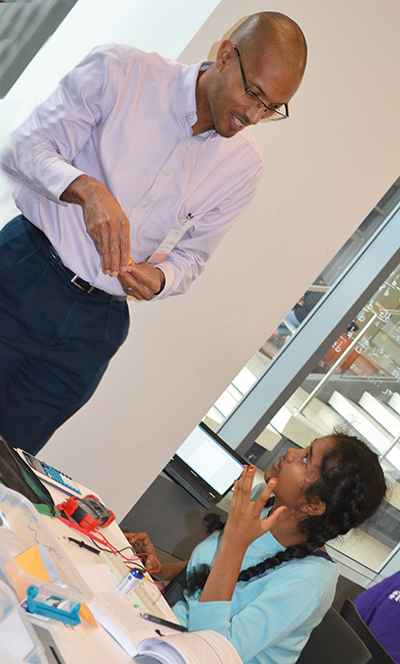
Lynford Goodard chats with a GLEE camper working on her circuit.
Of the 17 girls who participated this year, 12 were from Illinois, three from California, and one each from North Carolina and even as far away as Mexico City, Mexico.
Electrical and Computer Engineering (ECE) Professor Lynford Goddard, GLEE GAMES coordinator, believes that the benefits for the girls are numerous:
"They have had a unique opportunity to learn what college and the ECE major is like and also how engineers impact society and the types of problems researchers are working on. They have made friends from across the country who share similar interests, as well as university contacts for mentoring. On the technical side, they have also learned some key fundamental concepts about engineering, all while having fun doing projects."
So is GLEE having an impact? Yes. And not just the students, but the field of engineering itself is benefitting from the camp. Plus, GLEE is not only contributing to the diversity of the engineering workforce, but some of those students are studying engineering at Illinois.
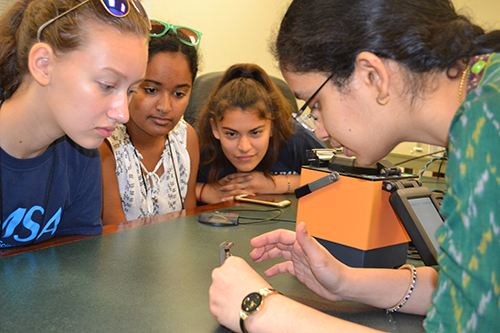
ECE Ph.D. student Aditi Udupa (right) shows GLEE GAMES campers how fiber splicing works during a visit to MNTL.
Goddard stipulates, though, that the timeline from being a camper to becoming a student is "rather long." It takes at least 3-4 years before the rising 10th and 11th graders who participate in GLEE become college students. "Nevertheless," he explains, "in the past few years, we are starting to see a significant number of these students complete their BS degrees at Illinois, some in ECE, but many in other engineering fields." He's also aware of two students who have completed MS degrees (both in other fields) and a few who are currently working on their MS degrees in ECE, including one at Illinois.
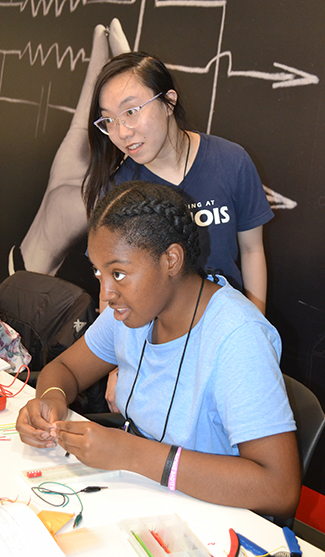
Wynter Chen helps a GLEE camper working on her LED calculator.
Because another important emphasis of the camp is exposing the girls to female role models in Electrical Engineering, Goddard enlisted as lab assistants a number of female ECE graduate and undergraduate students, whose goals were to pay it forward and to increase the number of women in electrical engineering.
For instance, one ECE undergrad who wanted to give back was rising sophomore Wynter Chen. She volunteered to be a lab assistant, hopeful that the camp might have the same kind of significant impact on the participating high school girls that it had on her when she attended GLEE GAMES in 2016.
“So I actually went to the same camp when I was in high school,” she explains, “and it was one of the things that made me decide to go into ECE here at Illinois. So I hope that the girls here also get to get that same experience. And I want to give back, so they can also learn what it is like at Illinois.”
No doubt speaking from personal experience, Chen shares why it’s beneficial to bring high school girls onto campus to do something like this.
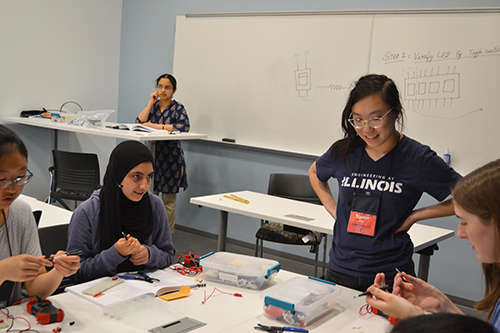
Wynter Chen (second from the right), stands by to lend her expertise as the GLEE GAMES campers make their LED calculators.
“In high school, they just don’t have a lot of opportunities to do things in labs directly,” she reveals, “whereas when they come to Illinois at the G.A.M.E.S. camp, they can have lab experience, go visit the campus, and also work with the professors here and get a sense of what college life really is.”
Another lab assistant, Madison Wilson, a rising senior in both ECE and Chemical Engineering, reports that she decided to help with the camp because she hadn’t really had a chance to give back to girls in engineering…and wanted to.
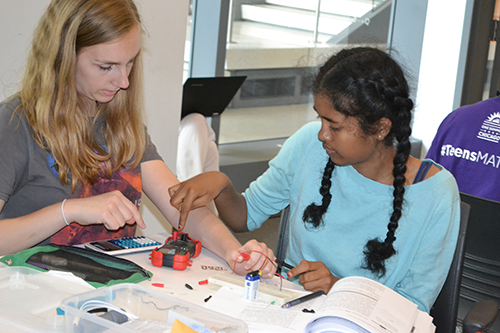
Madison Wilson (left) works with a GLEE camper who's building a circuit.
“I feel like my experience here [at Illinois] has been really great. I’ve learned a lot, and the school has really made me feel empowered.” A TA doing a dual degree, she adds, “I feel like there’s nothing really I can’t accomplish here. So, by leading girls this summer, I really hope to encourage them to pursue engineering— hopefully here—but also just in general to find what interests them and go after it.”
Wilson believes some of the GLEE participants may end up in engineering, based on the fact that some intend to participate in other GAMES camps in the future to explore other engineering disciplines.
“I feel like a lot of them are really excited. Some are returning, so that’s great to see, that they’re pursuing other disciplines within engineering, that this is definitely something they want to do. Also, I think the creativity aspect is really apparent in the girls, whether it’s applied to engineering or just in their lives. You got a lot of potential out there, it’ll be cool to see where they go.”
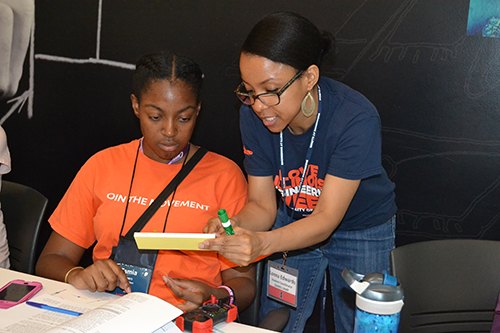
Lonna Edwards (right) helps a camper with her circuit.
In his 9th year running the camp, Electrical and Computer Engineering (ECE) Professor Lynford Goddard says he finds it very rewarding "to see the joy that the students have when building projects and when learning about our field.
Regarding faculty and students who were instructors for the camp, Goddard enjoys collaborating with them to run the camp: "Their time, effort, and energy has made it possible for us to offer the camp for so long," he explains.
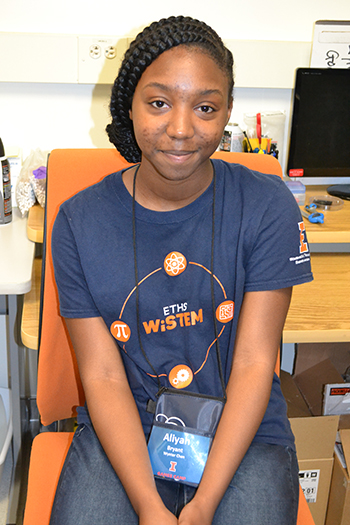
Aliyah Bryant, a rising senior at Evanston Township High.
One GLEE participant who got a sense of what college life at Illinois really is like was Aliyah Bryant, a rising senior at Evanston Township High School in Evanston, Illinois. Bryant shares why she attended GLEE camp. “I haven’t taken any engineering classes, and that’s something that I’ve always wanted to explore." She adds that it was also a way for her to stay on campus for a week at a campus that she’s thinking about coming to.
Regarding the camp’s impact, she says, “It’s really cool. I’ve learned a lot and built a lot, a lot of things that I never saw myself doing and discovered some more career paths and classes and labs and studies and research, so I learned a lot.”
Does she think electrical engineering is in her future? Maybe. “I’m still going to explore my options,” she adds, “but I’m definitely going to consider it.”
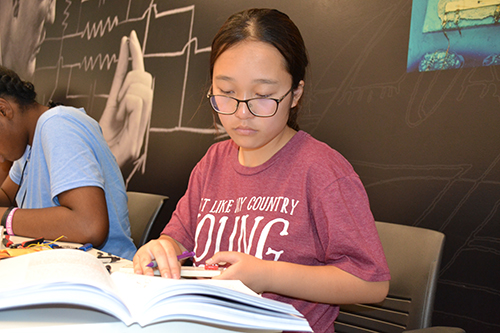
Lydia Hong building an LED caluculator.
Another GLEE participant, Lydia Hong, a rising sophomore from Minooka, a small Illinois suburb, shares why she came to GLEE: “I’m just kind of exploring my options before going to college tours. She declares that the camp had a significant impact on her:
“I honestly think this camp has been a life-changing experience for me. I haven’t been this hands-on in any of my classes, and I’m really liking this.” Hong adds that engineering is “definitely a possibility” down the road.
Story and photographs by: Elizabeth Innes, Communications Specialist, I-STEM Education Initiative.
More: 8-12 Outreach, GAMES, GLEE, Electrical and Computer Engineering, Summer Camp, Women in STEM, 2017
For additional I-STEM articles about GLEE G.A.M.E.S. camps, please see:
- Girls Explore Electrical and Computer Engineering During GLEE GAMES Camp (2017)
- Girls Experience Electrical Engineering First-Hand at the 2016 GLEE G.A.M.E.S. Camp (2016)
- GLEE Campers Learn How Electrical Engineering Impacts Their Everyday Lives (2013)
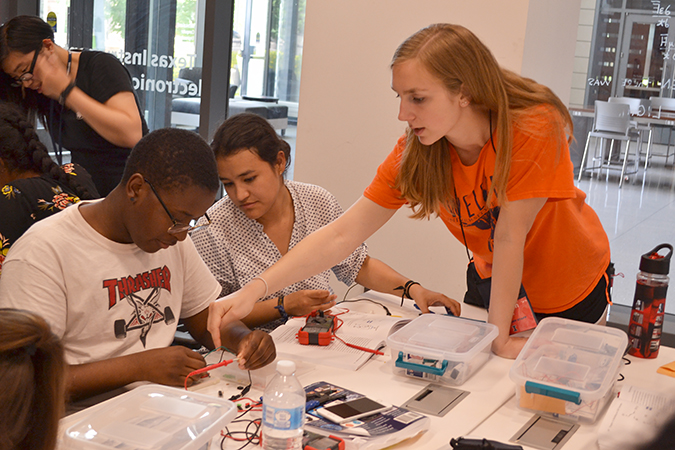
ECE senior Madison Wilson works with GLEE campers as they carefully follow the steps while building an LED calculator.













.jpg)
















